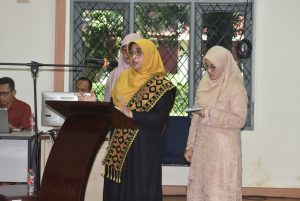On Tuesday, July 9, 2024, the Faculty of Public Health (FPH) at the Universitas Indonesia (UI) held an open doctoral promotion session for Epidemiology with the candidate Sumiati Bedah. The session was led by Prof. drg. Nurhayati A. Prihartono, M.P.H., M.Sc., Sc.D., with Promoter Prof. Dr. dr. Ratna Djuwita, M.P.H., and Co-promoters dr. Syahrizal Syarif, M.P.H., Ph.D., and Dr. drs. Lukman Hakim, S.K.M., S.H., M.M. The examiners for this open doctoral promotion session were Prof. dr. Syafruddin, Ph.D.; Prof. Dr. Budi Haryanto, S.K.M., M.Kes., M.Sc.; Prof. Dr. Besral, S.K.M., M.Sc.; and Dr. Masdalina Pane, S.K.M., M.Kes. Sumiati Bedah defended her dissertation entitled “The Effect of Mass Blood Survey Plus (MBS Plus) on the Detection of Malaria Cases in the Work Area of Hanura Health Center, Pesawaran District, Lampung Province in 2022”. The open session was held in the Doctoral Promotion Room of FPH UI.
In 2019, Indonesia reported 250,644 cases of malaria. The five provinces with the highest number of malaria cases were Papua, East Nusa Tenggara, West Papua, East Kalimantan, and Lampung. Meanwhile, DKI Jakarta and Bali, which border Lampung, have already reached malaria-free status. “Understanding the clinical symptoms of local malaria is very important for a region, as it can guide the community in recognizing the early signs of malaria,” said Sumiati during her dissertation summary presentation.
Findings based on observations of the Mass Blood Survey (MBS) activities in Sukajaya Lempasing Village as the intervention study site revealed that the validity test results showed that the combination of clinical symptoms most sensitive and specific for local malaria were headaches, fever, and chills, with a sensitivity of 88.43% and NPV of 84.95%. These symptoms can serve as good indicators for screening in local areas.
This study used two designs: cross-sectional to develop a clinical symptom algorithm for local malaria, which the researchers used as a guide during the intervention, and quasi-experimental to determine the effect of Mass Blood Survey (MBS) Plus in detecting malaria cases. The results showed that the intervention group (MBS Plus) detected 13 times more malaria cases than the control group (MBS reference). Further, the study examined the impact of the intervention, with the intervention group (MBS Plus) having a lower Annual Parasite Incidence (API) of 16.06 and detecting 13 times more malaria cases compared to the control group (MBS reference) with a higher API of 60.14. This suggests that if a similar intervention is applied in populations with high API, more malaria cases are likely to be detected. The 13-fold difference in cumulative incidence highlights the significant impact of the MBS Plus intervention in detecting and identifying malaria cases, even in areas with a low Annual Parasite Incidence (API).
“Identifying the local malaria symptom algorithm and the success of the MBS Plus intervention is crucial to continue with the aim that the more frequently malaria cases are found, the faster the mini-elimination (local elimination) will be achieved, with the principle of ‘find and treat’,” explained Sumiati.
This research is expected to help malaria elimination efforts in Indonesia, especially in regions with still high malaria cases. “These findings are very important in our efforts to combat malaria effectively,” said Dr. Lukman Hakim, Co-Promoter and Member of the Malaria Elimination Assessment Team. “By understanding the local clinical symptom patterns, we can empower health service providers to make more accurate diagnoses and deliver targeted treatments, ultimately contributing to the goal of mini-elimination (local malaria elimination),” he added.
This study also emphasizes the importance of ongoing interventions and collaborations between related institutions. Strengthening coordination and integrating healthcare services can enhance the effectiveness of malaria control and elimination efforts.
Based on the results of her dissertation, Sumiati Bedah was successfully declared a Doctor in the field of Epidemiology. Sumiati Bedah is the 112th graduate in Epidemiology and the 426th doctoral graduate from FPH UI. (prom)

